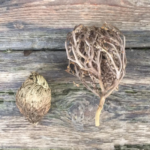The real Rose of Jericho
The process of the resurrection of the true Rose of Jericho
The true Rose of Jericho, scientifically known as Anastatica Hierochuntica, is a botanical wonder that captivates with its amazing ability to revive itself after drying. The revival process of this unique plant is a testament to nature’s extraordinary resilience and adaptability. In this article, we delve into the fascinating world of the resurrection of the true Rose of Jericho, explore the scientific mechanisms behind this phenomenon and solve the mysteries of her resurrection.
Facing harsh desert conditions, the true Rose of Jericho uses a variety of adaptations to ensure her survival. When the availability of water becomes scarce, the plant gradually enters a state of desiccation. Its paws curl up, forming a protective ball that protects the plant’s vital organs from drying out and external stressors. In this dormant state, the true Rose of Jericho appears lifeless, similar to dried grass.
However, when the plant encounters moisture, a truly awe-inspiring transformation takes place. When the water molecules penetrate the plant tissues, they trigger a series of physiological changes that begin the process of resurrection. Gradually, the curled petals of the true Jericho Rose begin to develop, the plant emerges from its desiccated state, resurrecting itself with amazing grace and resilience.
The resurrection of the true Rose of Jericho is a captivating sight to behold. As the palms expand, they become more and more cloudy, regaining their vitality. The once-dried ball becomes a vibrant, living organism, exuding the essence of life. This amazing resurrection process not only serves as a survival strategy for the plant but also showcases the complex beauty and adaptability of nature.
Scientists have discovered some of the mechanisms underlying the revival of the true Jericho. One key factor is the presence of special cells within the plant tissues called “hydroids” and “tracheid’s”. These cells play a crucial role in facilitating the absorption of water and its distribution throughout the plant structure. When the water enters the plant, these cells transfer it to the different parts, renewing and revitalizing the entire organism.
In addition, the true Jericho Rose has a unique ability to preserve its essential proteins and cellular structures during drying. This characteristic allows the plant to withstand the extreme conditions of arid environments without irreversible damage. Once water becomes available again, the plant effectively restarts its metabolic processes.
The resurrection of the true Rose of Jericho has implications beyond mere botanical intrigue. Scientists and researchers have examined the plant’s amazing cellular adaptations and responses to gain insights into potential applications in fields such as biotechnology and agriculture. Understanding the mechanisms behind plant revival may contribute to the development of drought-resistant crops and help combat the challenges posed by climate change.
The true Rose of Jericho stands as a testimony to nature’s ability to overcome adversity and flourish against all odds. Its revival process, driven by special cellular mechanisms and adaptations, reveals the inherent resilience and adaptability of the plant kingdom. The ability of the true Rose of Jericho to revive itself after drying is awe-inspiring and awe-inspiring, reminding us of the profound beauty and sophistication found in the natural world.






